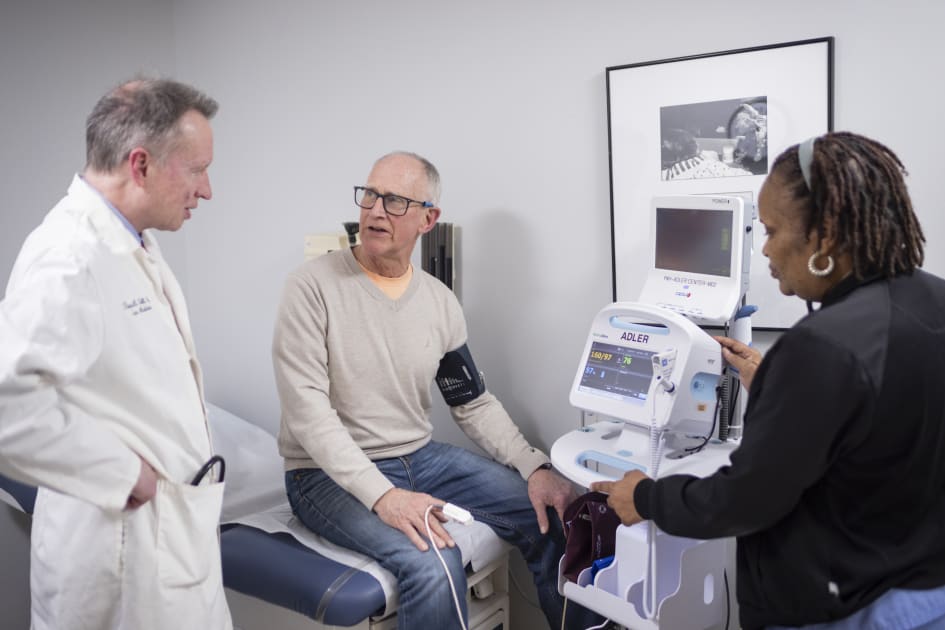In the Absence of Cures, Adler Center Guides Patients < Internal Medicine
One in five Americans will be 65 or older in 2030, and by 2034, older adults will outnumber children for the first time in U.S. history, according to the U.S. Census Bureau. With innovations in health that allow people to live longer, this fast-growing age group presents unique health challenges.
“There is a rising number of people living with chronic diseases of aging who would benefit by receiving care from a geriatrician,” said Terri Fried, MD, Humana Foundation Professor of Medicine (Geriatrics) and section chief of Geriatric Medicine at Yale School of Medicine. “As we get older, we can’t compartmentalize or treat these diseases and put them away somewhere; they become part of life.”
That’s where the Dorothy Adler Geriatric Assessment Center comes in. Since 1981, the center has been providing patients and their families with a comprehensive plan to optimize function, independence, and quality of life.
Older adults tend to vary a lot given the same set of conditions,” Fried said. “They’re going to have different priorities in terms of what matters to them and what they want to achieve.
Terri Fried, MD
“Patients travel to the Adler Center from as far as Rhode Island and New York, which speaks not only to the quality of care provided but also to the rarity of geriatrics specialty care,” Fried said.
Disease as a Part of Life
Geriatric care is fundamentally different from other types of care patients receive, Fried said, noting the focus on issues such as mobility and medication. Clinicians at the Adler Center understand how a combination of diseases impacts a patient’s life and the nonmedical resources that are available. The Adler Center focuses on helping patients achieve their functional goals and do the things that are meaningful to them.
“In geriatric medicine, we focus on quality of life and what’s important to the patient because aging is often marked by an accumulation of diseases that can’t be cured,” Fried said.
People often find their way to the Adler Center because of concerns about memory loss or cognition.
“Even after having seen another physician and being given a diagnosis of dementia and getting the appropriate workup, they come to us because patients and families have a lot of questions about how dementia is going to impact their and their caregivers’ lives,” Fried said.
Often, a caregiver has questions about how to make appropriate plans or handle a patient’s behavioral disturbances. “A big part of our geriatric assessment is understanding how we can help the caregiver, who is also our patient in a way,” Fried said. “We consider the sum total of diseases and attempt to allow people—both patients and caregivers—live as full a life as they can.”
How the Stories Play Out
For more than 40 years, the Adler Center has been working with patients and families to assess individuals’ capabilities and limitations, balancing safety and autonomy, helping them determine the amount and type of assistance needed to optimize function in their current living environment, and guiding them in determining when a transition to a different living situation may be appropriate, said Richard Marottoli, MD, MPH, professor of medicine (geriatrics) and medical director of the Adler Center.
Initially a clinic in the corner of Yale New Haven’s Primary Care Center, the center moved to a freestanding building across the street from the hospital in 2009. The center conducts medical exams, risk evaluation for falls, and cognitive and depression screening, and reviews patients’ priorities and goals of care, among other services. At each visit, physicians and case managers meet with the family and caregivers, as well as the patient, if appropriate. The center also coordinates with the patient’s other clinicians.
Most importantly, Fried adds, the Adler Center provides anticipatory guidance to patients and caregivers.
“A big part of our expertise is having seen enough stories to know how they play out,” Fried said. “We know that when people prepare in the right ways, their lives are better.”
Many families come to the Adler Center with the goal of having a patient live independently at home for as long as possible. The center helps these patients and families find services such as home health care agencies and volunteer support groups.
“We have worked closely with community agencies over the years to connect individuals with these organizations and the services they provide,” Marottoli said.
A critical part of taking care of older people is having access to services, Fried stressed.
There is a growing need for home-based primary care services when people can no longer leave their house, Fried noted. “To give people the choice of staying at home, we have to bring medical care to them,” she said.
Without direction, people wouldn’t know how to find services or support, Fried continued. “We can give people a direct phone number, cut through all the layers of the phone trees to ensure that people can speak to somebody to get educated about what services are available and how to get them,” she said.
A Fork in the Road
When the Adler Center started, physicians worked alongside case managers who acted as a point of continuity for family members. These case managers were jacks of all trades, acting as nurses and social workers, Fried recalls. No other clinic had that kind of model or setting, with both a patient room and a family room, so a family member could meet privately with the case manager and physician to raise concerns about a patient.
“We were at the forefront of using a case management model to assist and communicate with patients and families,” Marottoli said.
The challenge was keeping the center afloat. “Geriatrics is not a money-making proposition because we spend time with patients and we don’t do procedures,” Fried said. “It’s one of those cognitive-heavy specialties that tend to be money-losing.”
Today, Fried is proud of the collaboration between Yale School of Medicine and Yale New Haven Hospital leadership to enhance the center’s efficiency by optimizing schedule, structure, and flow. The center now has advanced practice providers five days a week to support case managers, provide continuity, and handle urgent patient issues that arise. Procedures and documentation have been streamlined. In the last year alone, the center has increased its capacity by 18% and reduced wait times from three or four months to three or four weeks.
The center has also adapted to the changing health care landscape, notes Marottoli. “We incorporated technology along the way,” he said. “One example is the availability of video follow-up visits, which can make life much easier for patients and families as mobility becomes increasingly challenged, for people in remote parts of the state, or in inclement weather situations.”
As the Adler Center continues to evolve, Fried would like it to play a larger role in complex decision-making. She envisions specialists from various disciplines referring patients to the center when deciding whether to pursue treatment. The center currently advises specialists on an informal basis, she said.
“Our cardiologists can do non-invasive valve replacements, and our oncologists have newer, less toxic forms of chemotherapy, but they recognize that undergoing these procedures is a difficult decision for an older person who has comorbidities or may not tolerate these things,” Fried said. “They are looking to the Adler Center to help.”
Ultimately, it’s about understanding how treating or not treating a disease will impact a patient’s life.
“Older adults tend to vary a lot given the same set of conditions,” Fried said. “They’re going to have different priorities in terms of what matters to them and what they want to achieve.”
Yale School of Medicine’s Department of Internal Medicine Section of Geriatrics strives to improve the health of older adults by providing exceptional patient care, training future leaders and innovators in aging, and engaging in cutting-edge research. To learn more, visit Geriatrics.













